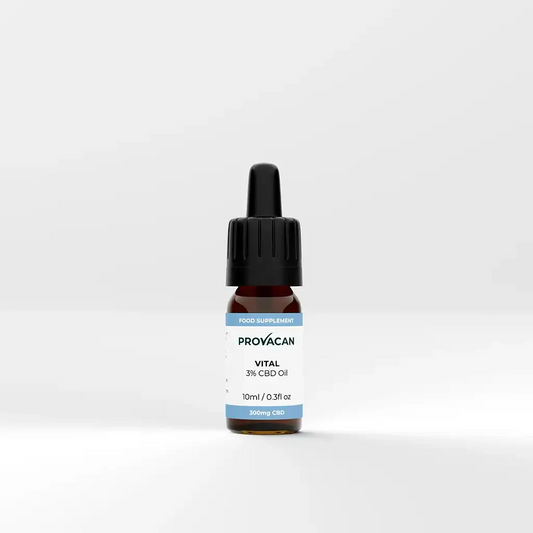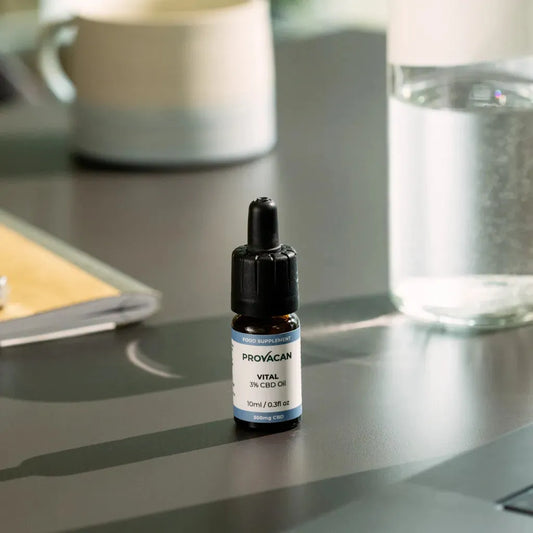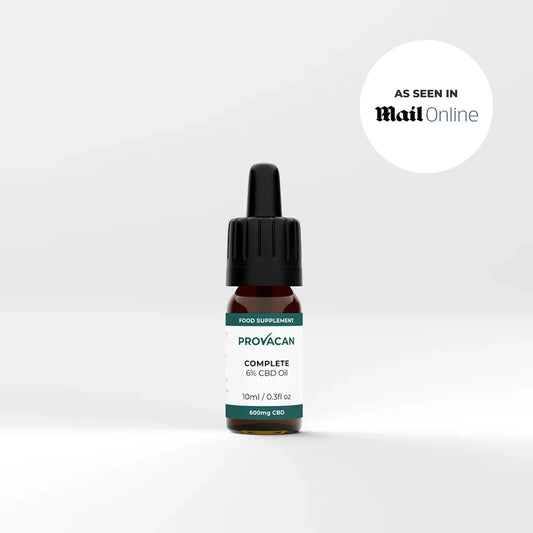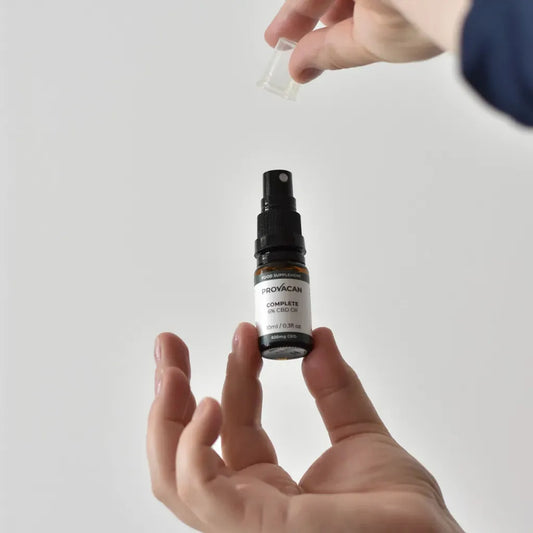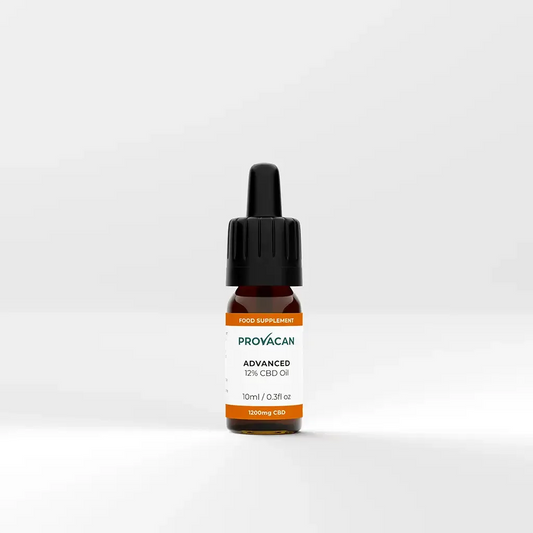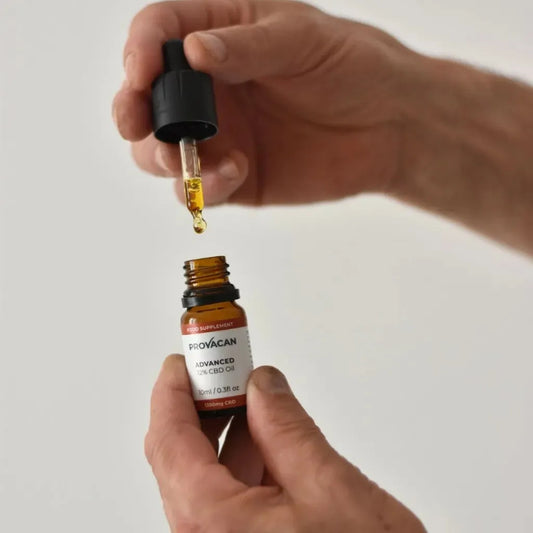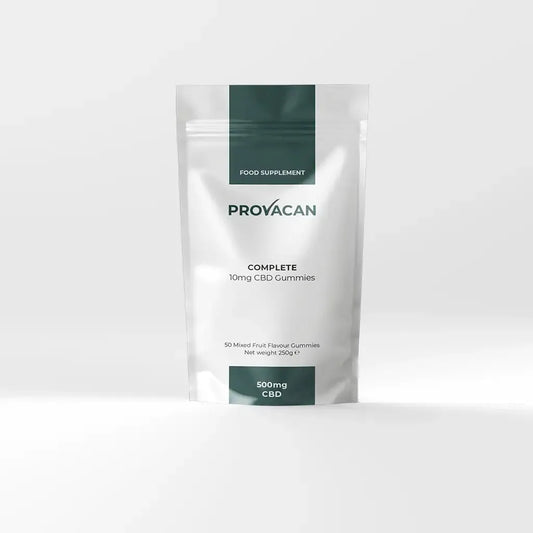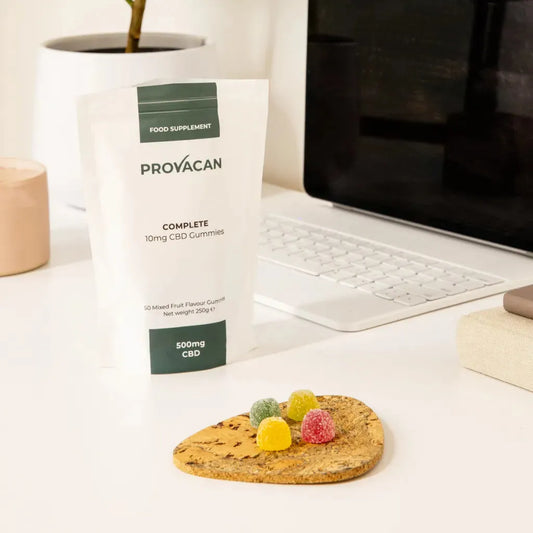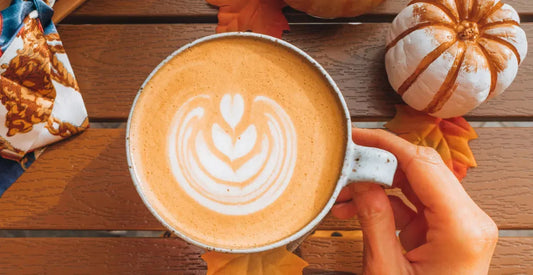Key Takeaways:
- Understanding Differences: Learn the distinct roles of CBD and THC in anxiety management, including their effects and benefits.
- Precautions and Safety: Discover important precautions and potential side effects when using CBD or THC for anxiety.
- Personalized Choices: Get insights into choosing the right option for anxiety relief based on your individual needs and preferences.
At Provacan, we lead the industry in harnessing the power of CBD to enhance mental wellbeing, offering products that are trusted by thousands for their quality and effectiveness. As pioneers in CBD research and development, we’re committed to providing reliable solutions that support emotional balance and alleviate anxiety.
CBD and THC are two prominent compounds from the cannabis plant, each with unique effects on anxiety. While CBD is celebrated for its calming, non-psychoactive properties, THC is known for its mind-altering effects, which can also influence anxiety levels. Understanding how these compounds interact with the body is essential for choosing the right approach to anxiety management.
In this article, we will explore the differences between CBD and THC, their respective roles in anxiety relief, and how to make an informed choice between the two.
How CBD Works For Anxiety
Cannabidiol, commonly known as CBD, has garnered significant attention for its potential therapeutic effects on various conditions, including anxiety. Unlike its psychoactive counterpart, THC, CBD offers a range of benefits without the "high," making it an attractive option for those seeking natural relief from anxiety. This article explores how CBD works to alleviate anxiety, delving into the science behind its interaction with the body and its potential benefits for different types of anxiety disorders.
Understanding The Endocannabinoid System (ECS) And Its Role In Anxiety
The Endocannabinoid System (ECS) is a complex cell-signaling system in the human body that plays a crucial role in regulating various physiological processes, including mood, sleep, appetite, and stress responses. CBD interacts with this system in a way that may help alleviate anxiety. Unlike THC, which directly binds to cannabinoid receptors in the brain, CBD has a more indirect influence. It enhances the body’s natural production of endocannabinoids and modulates receptors such as 5-HT1A, which is closely linked to serotonin, a neurotransmitter that plays a key role in mood regulation. By influencing these receptors, CBD may help to create a calming effect, reducing the symptoms of anxiety without causing the psychoactive effects associated with THC.
CBD’s Role In Promoting Calm And Relaxation
One of the primary reasons CBD is believed to be effective in reducing anxiety is its ability to promote a sense of calm and relaxation. This effect is particularly valuable for individuals who suffer from anxiety disorders such as Generalized Anxiety Disorder (GAD), Social Anxiety Disorder (SAD), and Post-Traumatic Stress Disorder (PTSD). Research indicates that CBD may help lower anxiety levels by interacting with receptors in the brain that regulate mood and stress responses. For example, the modulation of the 5-HT1A receptor by CBD is thought to enhance the availability of serotonin, contributing to improved mood and reduced anxiety. This calming effect allows individuals to manage their anxiety more effectively, whether it's in everyday situations or in response to specific stressors.
CBD As A Balancing Agent For THC-Induced Anxiety
While THC can have therapeutic effects, it is also known to cause anxiety and paranoia, particularly in high doses. CBD is often used in combination with THC to mitigate these adverse effects. This balancing act is one of the reasons why CBD is considered a versatile compound in the treatment of anxiety. When used together, CBD can counteract the anxiety-inducing properties of THC, making the overall experience more tolerable for individuals who are sensitive to THC. This combination approach allows users to benefit from the therapeutic effects of both cannabinoids while minimizing potential negative side effects.
The Potential Of CBD In Treating Various Anxiety Disorders
CBD’s non-intoxicating nature and its potential to alleviate anxiety through different mechanisms make it a promising option for treating various anxiety disorders. Research suggests that CBD may be effective in managing Generalized Anxiety Disorder (GAD), Social Anxiety Disorder (SAD), and Post-Traumatic Stress Disorder (PTSD). These conditions, while different in their manifestations, share a common thread of excessive anxiety and stress. CBD’s ability to interact with the endocannabinoid system and other mood-regulating receptors provides a multi-faceted approach to anxiety relief. Moreover, the lack of significant side effects compared to traditional anti-anxiety medications makes CBD an appealing alternative for many individuals.
How THC Works For Anxiety
Tetrahydrocannabinol, commonly known as THC, is the primary psychoactive compound found in cannabis and is widely recognized for its mind-altering effects. While THC is often associated with the "high" that cannabis users experience, it also has a complex relationship with anxiety. Depending on various factors, including dosage and individual sensitivity, THC can either alleviate anxiety or exacerbate it. This article explores how THC interacts with the brain, its potential benefits for anxiety relief, and the risks associated with its use.
THC’s Interaction With The Brain’s Cannabinoid Receptors
THC works by binding directly to the cannabinoid receptors in the brain, specifically the CB1 receptors. These receptors are part of the endocannabinoid system, which plays a vital role in regulating mood, memory, pain, and appetite. The interaction between THC and CB1 receptors is what causes the psychoactive effects commonly associated with cannabis use, such as euphoria, altered perception, and relaxation. For some individuals, this interaction can lead to a temporary reduction in anxiety, as the calming effects of THC help to distract from stress and anxious thoughts. However, this same interaction can also be a source of anxiety if the dose is too high or if the individual is particularly sensitive to THC’s effects.
The Dual Nature Of THC In Anxiety Management
The effects of THC on anxiety are complex and can vary significantly from person to person. In low to moderate doses, THC can promote relaxation and a sense of contentment, which may help reduce anxiety for some individuals. This is particularly true for conditions like Post-Traumatic Stress Disorder (PTSD), where THC’s ability to reduce hyperarousal and intrusive thoughts can be beneficial. However, the effects of THC are not universally calming. In higher doses, THC can overstimulate the brain’s anxiety pathways, leading to increased anxiety, paranoia, or even panic attacks. This dual nature of THC highlights the importance of careful dosage control and self-awareness when using cannabis for anxiety management.
The Impact Of Cannabis Strains And THC Content On Anxiety
Not all cannabis strains affect anxiety in the same way. The specific strain of cannabis and its THC content play a crucial role in determining its impact on anxiety. Strains that are high in THC are more likely to cause anxiety or exacerbate existing anxiety symptoms, especially in individuals who are sensitive to THC. On the other hand, strains that have a more balanced ratio of THC to CBD may offer more calming effects, as CBD is known to counteract some of the anxiety-inducing effects of THC. Therefore, choosing the right strain and understanding the THC content is essential for those considering cannabis as a treatment for anxiety.
Understanding Individual Sensitivity And Tolerance To THC
One of the key factors in determining how THC will affect anxiety is individual sensitivity and tolerance. Some people may find that even small amounts of THC help to reduce their anxiety, while others may experience heightened anxiety or paranoia with the same dose. Tolerance levels also play a significant role; regular cannabis users may develop a tolerance to THC, requiring higher doses to achieve the same effects. However, higher doses increase the risk of anxiety and other adverse effects. This variability underscores the importance of starting with low doses and gradually increasing as needed while paying close attention to how your body and mind respond.
CBD vs. THC: Which Is More Effective For Anxiety?
When it comes to anxiety relief, the effectiveness of CBD versus THC can vary greatly depending on the individual, the specific type of anxiety, and the dosage used. Both compounds offer potential benefits, but they do so in different ways, and the choice between them often depends on personal preferences and tolerance.
CBD For Anxiety:
CBD is generally considered to be more suitable for those who want to manage anxiety without experiencing any psychoactive effects. Its ability to promote relaxation and reduce stress without altering perception makes it a popular choice for daily use. Additionally, CBD's non-intoxicating nature allows for flexibility in dosing, making it easier to find the right balance for anxiety relief. Research has shown that CBD can be particularly effective for generalized anxiety disorder, social anxiety, and PTSD.
THC For Anxiety
THC, on the other hand, may be more effective for certain individuals who find that its psychoactive effects help them disconnect from anxiety-inducing thoughts. For some, the euphoria and relaxation brought on by THC can be a welcome relief from anxiety symptoms. However, this comes with the caveat that THC can also exacerbate anxiety at higher doses, especially in individuals who are sensitive to its effects. This makes THC a less predictable option for anxiety management compared to CBD.
Comparing Effectiveness
In general, CBD is often recommended as the first line of treatment for anxiety due to its consistent calming effects and lower risk of adverse reactions. THC may be considered in cases where CBD alone is not sufficient or where an individual prefers the unique effects of THC. Some people find that a combination of both, in a balanced ratio, provides the best results, offering the benefits of both compounds while minimizing the risk of increased anxiety.
Precautions And Potential Side Effects Of CBD And THC
When using CBD or THC for anxiety, it's crucial to understand their potential side effects and take necessary precautions. Both compounds can help with anxiety, but their effects depend on factors like dosage, individual sensitivity, and method of consumption. Being informed ensures safer and more effective use.
Precautions When Using CBD
CBD is generally safe and well-tolerated, but starting with a low dose is key to avoiding unwanted side effects like drowsiness, dry mouth, or appetite changes. It's also important to consult a healthcare provider, especially if you're on other medications, as CBD can interact with certain drugs.
Quality matters when choosing CBD products. Since the market isn't tightly regulated, potency and purity can vary. Always buy from reputable sources that offer third-party lab testing to ensure you're getting a safe and effective product.
Precautions When Using THC
THC requires more caution due to its psychoactive effects. Start with a low dose, particularly if you're new to THC or have a history of anxiety, as higher doses can increase anxiety, paranoia, or even cause panic attacks. THC can also temporarily affect cognitive functions like memory and coordination, so avoid activities like driving after use.
Choosing The Right Method Of Consumption
The way you consume CBD or THC affects how quickly and strongly you feel the effects. Edibles take longer to kick in and can lead to accidental overconsumption. In contrast, tinctures and vaping offer quicker effects and more precise dosing, which may be better for anxiety management.
General Considerations
Consider your overall health and any other medications when using CBD or THC. Consulting a healthcare professional can help you navigate these factors and choose the best approach for your needs. Proper precautions can help you safely benefit from these compounds in managing anxiety.
How To Choose The Right Option For You
Choosing between CBD and THC for anxiety relief depends on factors like your anxiety type, tolerance, and lifestyle. Understanding these aspects can help you make an informed decision that suits your needs.
- Understanding Your Anxiety Type: If your anxiety is mild to moderate, CBD may be enough to help you manage it, providing calm without altering your mental state. For more severe anxiety, especially related to conditions like PTSD, THC might be considered, but it should be used cautiously due to its psychoactive effects.
- Tolerance to Psychoactive Effects: If you want to avoid psychoactive effects, CBD is the better choice. It allows you to manage anxiety without experiencing a “high.” However, if you find that THC’s psychoactive effects help alleviate anxiety, it could be a good option, but start with a low dose to gauge your reaction.
- Consideration of Side Effects: CBD is generally safe with mild side effects like drowsiness or dry mouth. THC, on the other hand, can cause more pronounced effects like impaired memory or increased anxiety, especially at higher doses. If you’re taking other medications, particularly those that interact with CBD, consult a healthcare provider first.
- Method of Consumption: The way you consume CBD or THC affects how quickly and strongly you feel the effects. Vaping or tinctures offer quicker relief, while edibles provide longer-lasting effects. Choose the method that best fits your anxiety management needs and lifestyle.
- Legal Considerations: Make sure the product you choose is legal in your area. CBD is widely legal, but THC’s legality varies. Check local laws to ensure compliance and access to safe products.
- Personal Experimentation: Finding the right option may require some trial and error. Start with low doses and adjust as needed to find what works best for you. Keep track of your experiences to help guide your decisions.
- Consultation with a Healthcare Provider: Consulting with a healthcare provider can offer personalized advice, helping you navigate the choice between CBD and THC based on your medical history and anxiety symptoms.
Choosing between CBD and THC for anxiety relief involves considering your anxiety type, tolerance, and lifestyle. With careful thought and professional guidance, you can find the best option to manage your anxiety effectively.
Final Thoughts
In managing anxiety, both CBD and THC offer distinct benefits, and the best choice depends on your individual needs and how your body responds. CBD is often preferred for its calming effects without the psychoactive high, making it suitable for daily use and those sensitive to THC. It provides gentle anxiety relief with minimal side effects. THC may be more effective for those who benefit from its psychoactive effects, such as a sense of euphoria or distraction from anxious thoughts. However, THC's potential to increase anxiety, especially at higher doses, requires careful consideration and dosing.
Combining CBD and THC can create a balanced approach, with CBD potentially mitigating some of THC's anxiety-inducing effects. This combination might be worth exploring if neither compound alone offers sufficient relief. Ultimately, choosing between CBD and THC should involve cautious experimentation, starting with low doses and monitoring your response. Consulting a healthcare professional can also help guide you toward the most appropriate choice based on your specific anxiety symptoms and overall health.
Read also:
- A Beginner's Guide to CBD Dosage
- Are Edibles Legal in the UK? Legality of CBD and THC Gummies
- Can You Mix CBD and Alcohol?
Frequently Asked Questions About CBD And THC For Anxiety
What are the main differences between CBD and THC?
CBD is non-psychoactive and does not produce a “high,” whereas THC is psychoactive and can alter perception and mood.
Can I use CBD or THC to treat other conditions besides anxiety?
Yes, both CBD and THC are used for various conditions like chronic pain, insomnia, and inflammation. CBD is also popular for epilepsy, while THC is used for appetite stimulation.
Is it safe to use CBD or THC with prescription medications?
CBD can interact with certain medications, especially those metabolized by the liver. THC may also interact with medications. Always consult a healthcare provider before combining them with prescriptions.
Are there any non-cannabis alternatives for anxiety relief?
Yes, other natural remedies include herbal supplements like valerian root and chamomile, as well as practices like meditation, yoga, and regular exercise.
How long do the effects of CBD and THC last?
The effects of CBD can last from 2 to 6 hours, depending on the method of consumption. THC effects typically last between 1 to 4 hours but can vary based on dosage and individual tolerance.
Can I develop a tolerance to CBD or THC over time?
It’s possible to develop a tolerance to THC, which may require higher doses to achieve the same effect. CBD is less likely to cause tolerance, though long-term effects are still being studied.
What should I do if I experience negative effects from THC?
If you experience increased anxiety or paranoia from THC, consider lowering the dose, switching to a CBD-dominant product, or ceasing use. Staying calm and hydrated can also help.
Can I drive after using CBD or THC?
While CBD generally does not impair driving, THC can significantly affect your ability to operate a vehicle safely. It’s illegal to drive under the influence of THC in many places.
How do I find high-quality CBD or THC products?
Look for products from reputable brands that provide third-party lab testing. This ensures the product’s purity, potency, and lack of harmful contaminants.
Can CBD or THC cause a positive drug test?
THC can cause a positive drug test. Some CBD products may contain trace amounts of THC that could also trigger a positive result, so it’s essential to choose broad-spectrum or isolate CBD if this is a concern.
Sources:
- Skelley, J. W., Deas, C. M., Curren, Z., & Ennis, J. (2020). Use of cannabidiol in anxiety and anxiety-related disorders. Journal of the American Pharmacists Association, 60(1), 253–261. https://doi.org/10.1016/j.japh.2019.11.008
- Lichenstein, S. D. (2022). THC, CBD, and Anxiety: a Review of Recent Findings on the Anxiolytic and Anxiogenic Effects of Cannabis’ Primary Cannabinoids. Current Addiction Reports. https://doi.org/10.1007/s40429-022-00450-7
- Zuardi, A. W., Shirakawa, I., Finkelfarb, E., & Karniol, I. G. (1982). Action of cannabidiol on the anxiety and other effects produced by ?9-THC in normal subjects. Psychopharmacology, 76(3), 245–250. https://doi.org/10.1007/bf00432554




